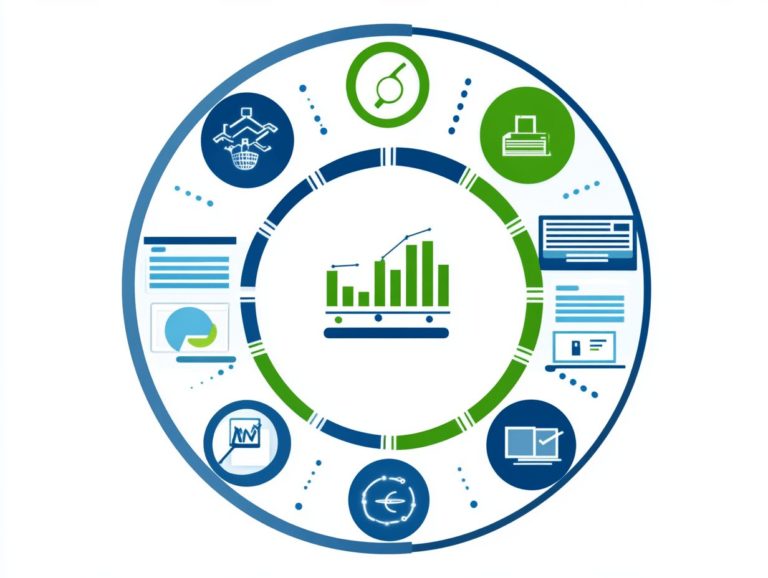Understanding Cloud Cost Management Strategies
In today s digital landscape, mastering cloud cost management is essential for businesses like yours that aim to maximize technology investments.
As organizations increasingly depend on cloud services, your understanding of effective expense management can unlock substantial savings and elevate operational efficiency.
This article delves into the critical nature of cloud cost management, showcasing key strategies such as resource optimization and automation.
You ll explore the available tools, best practices to adopt, and the challenges that may arise along the way.
Dive in to discover how you can take command of your cloud spending and ensure that your resources are utilized wisely.
Contents
Key Takeaways:

- Efficient cloud cost management helps optimize spending.
- Strategies like resource optimization and automation are key.
- Tools and best practices can drive successful cost management.
What is Cloud Cost Management?
Cloud Cost Management is your gateway to mastering the intricacies of managing and optimizing your expenses related to cloud computing services, particularly those provided by leading platforms like AWS, Google Cloud, and Microsoft Azure.
This approach involves a suite of strategic practices, including finding unexpected expenses, adjusting your cloud resources to fit your actual needs, and tapping into discount programs.
By doing so, you ll see how your budgets can match your actual usage perfectly, saving you money!
Why is Cloud Cost Management Important?
Cloud Cost Management is crucial for your business, as it directly influences your cloud expenses and overall financial well-being.
Many organizations emphasize that effective management strategies are essential for navigating the complexities of cloud costs and optimizing resource utilization.
Benefits and Challenges
The benefits of cloud cost management are significant. You gain enhanced visibility into cloud expenses and improved adherence to budgets.
However, challenges often arise from the complexities of managing diverse cloud services.
Additionally, the necessity for robust cost optimization strategies that align with your business goals cannot be overlooked.
When you effectively implement cloud cost management, you can achieve improved financial management, allowing you to allocate resources more efficiently.
For instance, consider a leading software company that reported a remarkable 30% reduction in cloud spending after adopting a centralized cost management tool. This change helped them predict their budgets better and streamline operations.
Yet, navigating these advantages isn t without its hurdles. Unexpected costs can accumulate swiftly, particularly when utilizing multiple cloud providers, each with its own pricing structure.
Companies like XYZ Corp have encountered difficulties in maintaining operational efficiency due to this complexity. This underscores the importance of integrating comprehensive cost management solutions capable of addressing such multifaceted challenges.
Key Strategies for Cloud Cost Management
Implementing essential strategies for cloud cost management is crucial for you to optimize your cloud budget and maximize the value you derive from your cloud resources.
Key approaches include:
- Cost optimization
- Right-sizing resources
- Conducting regular financial assessments
By adopting these practices, you can maintain greater control over your cloud expenditures and ensure that every dollar spent contributes to your organizational goals.
1. Resource Optimization

Resource optimization in cloud cost management is all about fine-tuning your cloud resources to align with your actual needs. By adjusting resource sizes, you can minimize waste and ensure you re making the most efficient use of your cloud services.
This process helps you reduce costs and improve performance. Assessing your cloud resource utilization allows you to pinpoint underused or overprovisioned resources, which can significantly impact your overall cloud expenditure.
By implementing methods like autoscaling and closely monitoring usage patterns, you can refine your cloud services. Tools such as AWS Cost Explorer, Azure Advisor, and various third-party monitoring solutions provide valuable insights that help you track essential metrics like CPU utilization and memory consumption.
Adopting effective resource optimization strategies not only reduces costs but also boosts operational efficiency, paving the way for more sustainable cloud practices in your organization.
2. Automation
Automation is essential in cloud cost management, enabling you to streamline processes, boost efficiency, and leverage cost anomaly detection to automatically spot unusual spending patterns.
By harnessing automation, your organization can dramatically lower the risk of manual errors that often lead to overspending or resource mismanagement. Automation tools expedite the detection of cost anomalies and enable rapid responses, ensuring that unexpected charges are swiftly resolved.
Cloud management platforms and machine learning tools streamline these processes, providing you with real-time insights into expenses and consumption patterns.
Features like automated reporting and alerts keep your team informed, allowing you to make data-driven decisions and optimize your cloud spending with ease.
3. Monitoring and Analysis
Monitoring and analysis are crucial elements of effective cloud cost management, enabling you to systematically track your cloud expenditures and delve into cost data for informed choices.
By harnessing these components, you uncover deeper insights into your cloud usage patterns, helping you pinpoint areas of overspending and optimize resource allocation.
Utilizing monitoring tools like CloudHealth or AWS Cost Explorer provides visualizations that highlight spending trends and resource utilization. This analysis reveals potential savings and supercharges your budgeting!
With real-time reporting capabilities, these analytics solutions enable you to make agile adjustments, turning your cloud financial management from reactive into a proactive strategy. This leads to more informed and strategic investments in your cloud resources, ensuring you’re getting the most value for your expenditure.
4. Cost Allocation and Budgeting
Effective cost allocation and budgeting are essential for mastering cloud cost management. They offer you a structured approach to distribute costs across various cloud services and departments while keeping a keen eye on overall expenditures.
Use precise cost allocation methods to pinpoint the specific drivers of your cloud expenses and make informed decisions grounded in this valuable insight. Integrating cloud cost intelligence tools can significantly elevate your budgeting practices.
These tools enable you to set financial targets, monitor real-time spending, and assess the return on investment for different cloud initiatives. Popular solutions, including cloud cost management platforms, help generate comprehensive reports, visualize spending trends, and optimize resource utilization, ultimately equipping you to manage your cloud environment with increased efficiency.
Tools and Technologies for Cloud Cost Management
The array of tools and technologies available for cloud cost management is impressive. Solutions such as CloudZero and CloudHealth are crafted to assist you in monitoring expenditures, optimizing costs, and enhancing your overall financial performance across various cloud providers.
By leveraging these tools, you gain greater visibility into your spending and make informed decisions that drive efficiency and savings.
Start optimizing your cloud costs today!
Popular Options and Features

When considering cloud cost management tools, options like CloudZero and CloudHealth offer robust features. They provide valuable insights into your cloud services usage and help you implement effective cost optimization strategies.
These tools come equipped with detailed reporting capabilities. You can visualize spending trends and pinpoint areas where significant savings can be realized.
For example, CloudHealth is renowned for its actionable recommendations and comprehensive cost analysis. Meanwhile, CloudZero stands out with its real-time cost monitoring and alerts for unusual spending spikes.
You might also appreciate tools that provide budgeting and forecasting functionalities. These features enhance your ability to set financial expectations and improve overall accountability.
By weighing these unique offerings, you can choose a cloud cost management solution that aligns perfectly with your specific needs and elevates your financial oversight.
Best Practices for Effective Cloud Cost Management
Embracing best practices for effective cloud cost management is crucial for any organization aiming to control its cloud expenditures. It also optimizes resource utilization and enhances overall financial management strategies.
With actionable tips and techniques at your disposal, you can implement these practices effortlessly and achieve significant improvements in your cloud financial governance.
Tips and Techniques for Success
Successful cloud cost management relies on practical tips and techniques. Conducting regular audits of your cloud resources and utilization patterns can lead to substantial savings.
To maximize the value of your cloud investments, adopt a systematic approach to monitoring usage patterns. Set up alerts for unexpected spending, perform monthly reviews to identify underutilized resources, and utilize your cloud provider’s tools for detailed reporting.
Consider implementing automated scaling solutions that adjust resources dynamically based on real-time demand. This helps you avoid unnecessary charges.
Engaging stakeholders in cost management discussions is crucial. It fosters a culture of accountability and equips your teams with training on cloud financial best practices.
Frequently Asked Questions
What is cloud cost management?
Cloud cost management refers to the process of monitoring, analyzing, and optimizing the costs associated with using cloud computing services. It involves implementing strategies and tools to control and reduce cloud expenses while maintaining the desired level of performance and scalability.
Why is understanding cloud cost management strategies important?

Understanding cloud cost management strategies is essential for businesses using cloud services. It allows them to effectively manage their expenses and optimize their usage. For a deeper insight, understanding hybrid cloud cost structures is crucial, as without proper management, cloud costs can quickly add up, leading to overspending and budget constraints.
What are some common cloud cost management strategies?
Some common cloud cost management strategies include rightsizing, which means adjusting resources to match actual usage. Other strategies include using reserved instances or discounts and implementing automation to optimize resource allocation and reduce waste.
How can I track my cloud costs?
Various tools and services are available for tracking cloud costs, such as cloud billing and cost management platforms. Third-party cost management tools and cloud provider-specific cost monitoring services can provide insights into usage and expenses, helping businesses make informed decisions.
How can I reduce my cloud costs?
There are several ways to reduce cloud costs, including using cost management tools and services, optimizing resource usage, implementing automation, and taking advantage of discounts and cost-saving offerings from cloud providers. Regularly reviewing and adjusting your cloud usage can also help identify areas for cost reduction.
Want to learn more? Check out our other resources!
Are there any risks associated with cloud cost management?
Yes, there are risks in cloud cost management, including spending too much or not enough. You can avoid these risks by using effective cost management strategies and the right tools.
Regularly check your cloud costs to spot potential issues. Keeping your cloud costs in check is essential. Don’t wait until it’s too late!






